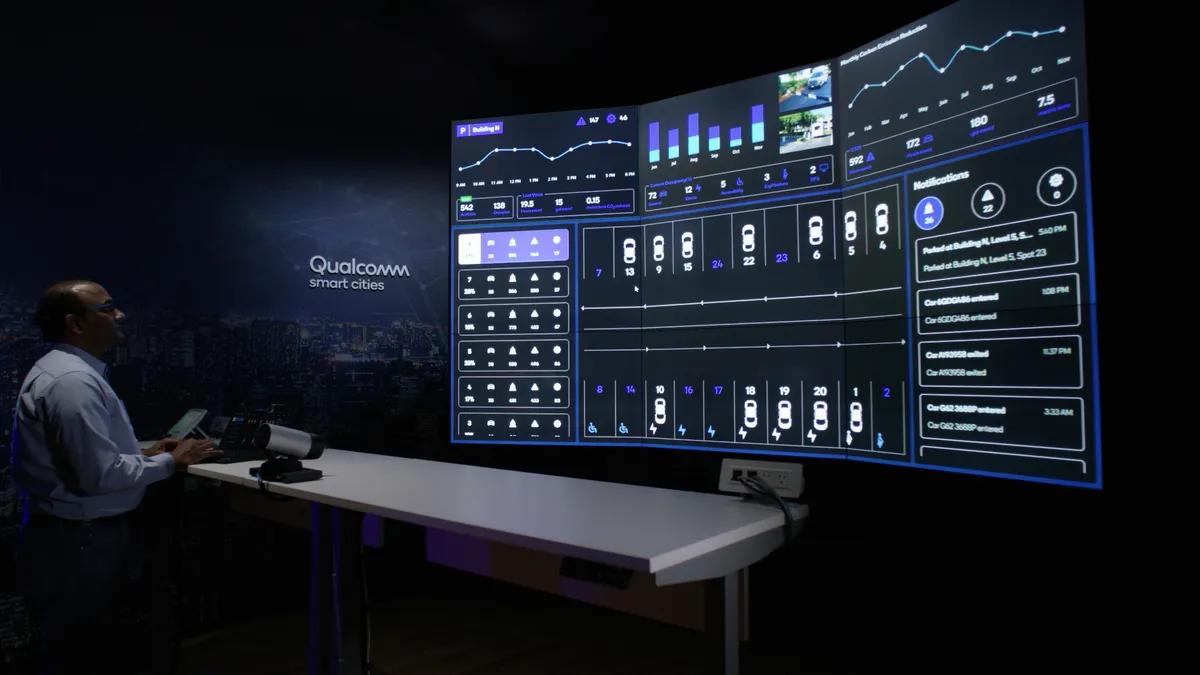Dive Brief:
- Qualcomm Technologies unveiled this week an end-to-end IoT Services Suite that will offer a wide variety of "as-a-service" solutions to support the digitization of smart cities and connected spaces, including hospitals, campuses and factories.
- The suite aims to remove the complexity, barriers and fragmentation associated with digitization by enabling users to "bring a solution right out of the box, to be plugged-and-played and monetized," said Sanjeet Pandit, global head of smart cities at Qualcomm Technologies. This streamlined offering of solutions allows every city department to communicate and collaborate more effectively, he said.
- In an effort to "bring to life a tangible proof point" of the suite, Qualcomm also launched a smart campus in San Diego that will exhibit available IoT solutions, such as smart parking and AI-enabled security offerings.
Dive Insight:
As IoT capabilities continue to evolve, so do opportunities for "as-a-service" solutions in emerging markets. While transit agencies tap mobility-as-a-service offerings and cities explore energy efficiency-as-a-service, the time is ripe for more public-facing sectors to prospect digitization.
"Those things need their space within the city. And that requires digitization," Pandit said. "So harnessing the power of what IoT can do is primarily taking the practice into two areas: smart cities, and smart connected spaces."
Qualcomm's suite will enable users to create and share smart "as-a-service" solutions across every vertical from education to construction management, logistics and healthcare. Anything can be digitized to fit an "as-a-service" model, Pandit said, pointing to farmers in Thailand that are piloting chicken farming-as-a-service solutions for water preservation.
By streamlining these solutions into one centralized location like the IoT Services Suite, Pandit believes Qualcomm has "cracked the code in smart cities."
"There's nobody else bringing this to the table," Pandit said. "We're bringing the best of the breed to the table. There's a lot to be done and we cannot do it alone."
In a 2019 interview with Smart Cities Dive, Pandit said Qualcomm has always pushed to be a trailblazer in its technologies, noting: "If you're second, you're the first among all the losers." Pandit said this attitude was a benefit to Qualcomm ahead of the coronavirus (COVID-19) pandemic, despite its devastating and widespread impacts on the economy.
He pointed to the Qualcomm GoSafe device — unveiled within about 60 days of the onset of the pandemic — to check temperatures and mask usage of building and property visitors. "We were the first to bring it to the market, and that took off. We were literally the first to come out with it because we had a head start, because we knew that we had to be first," Pandit said.
The announcement of Qualcomm's IoT suite and smart campus opening coincided with its second-annual Smart Cities Accelerate event, which brought together IoT industry executives, thought leaders, practitioners and others in the Qualcomm Smart Cities Accelerator Program. This year's sessions, held virtually, included product demos and panels of U.S. city mayors and industry experts.












